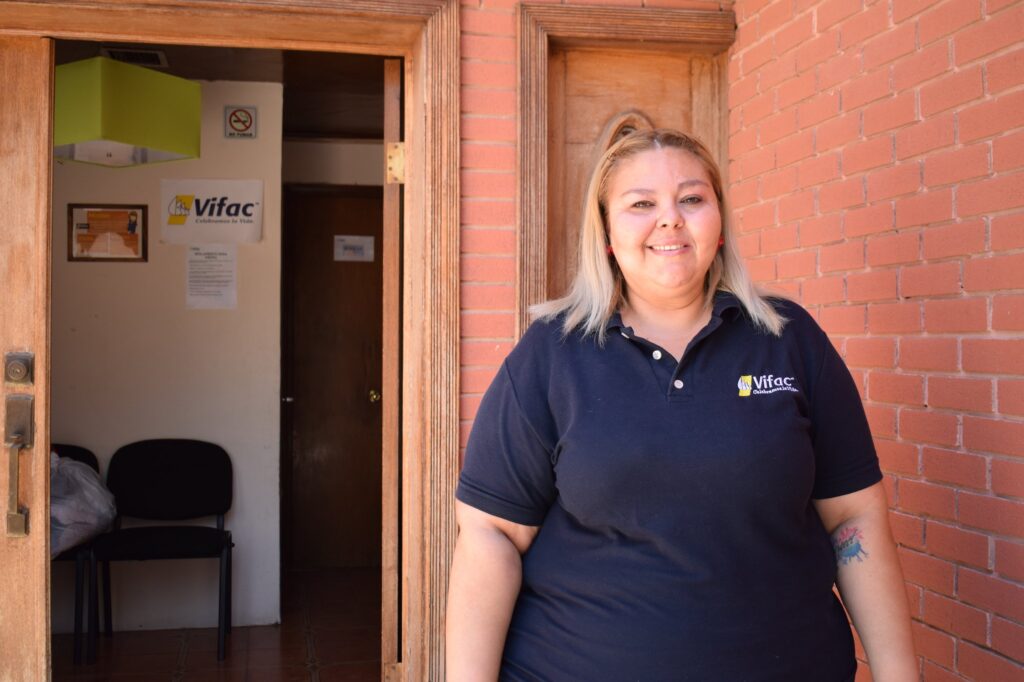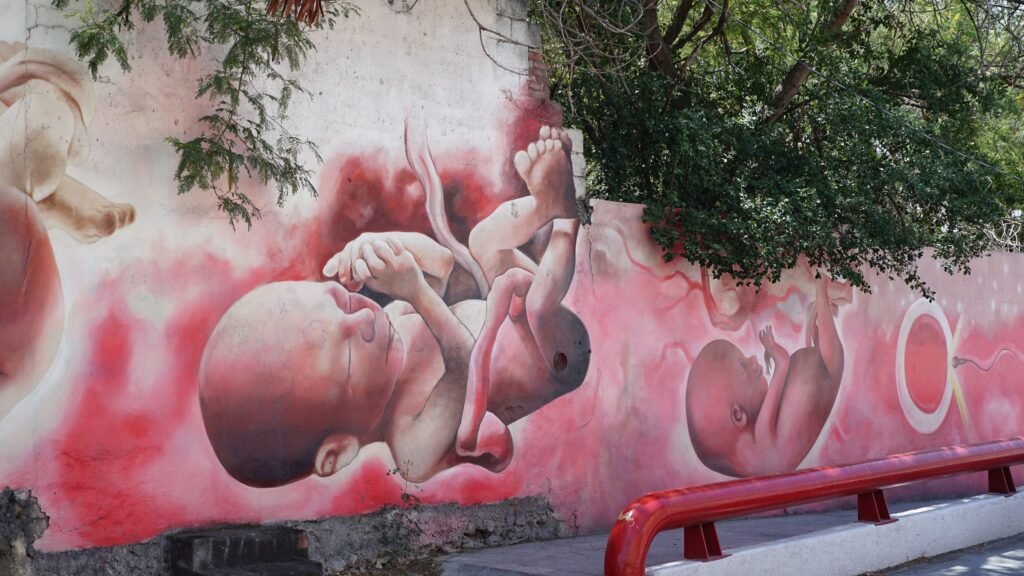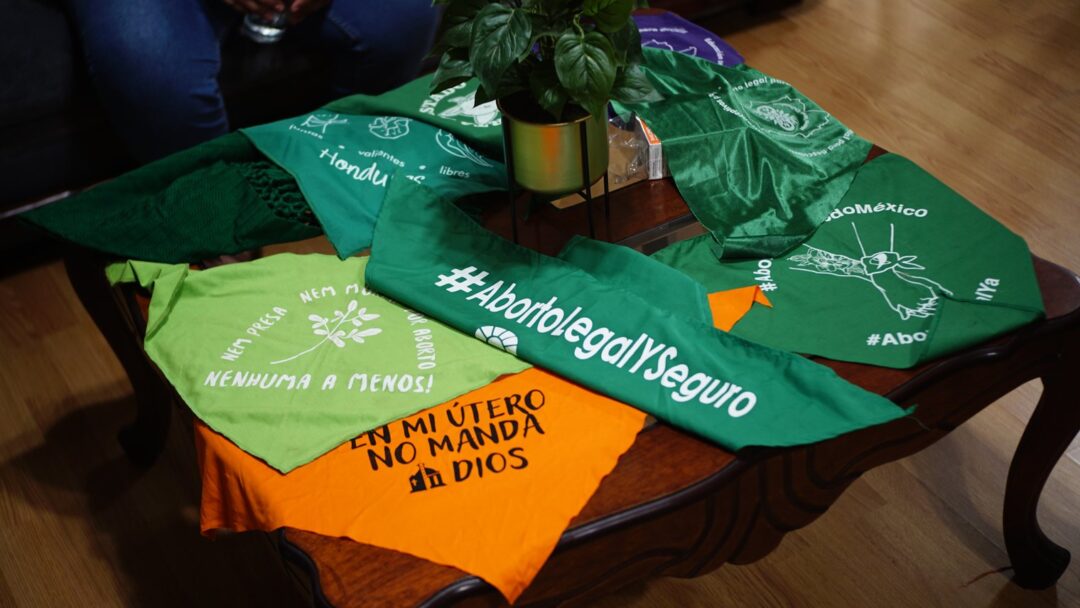As Mexico’s Supreme Court paves the way for national abortion rights, groups like Vifac are spearheading a backlash
Por Dánae Vílchez y Verónica Martínez
openDemocracy / La Verdad
Since federal protection for abortion in the US was removed a year ago, when the Supreme Court overturned its decades-old Roe v Wade ruling, thousands of American women seeking safe abortions have looked south to the northern border states of Mexico for reproductive choice.
But in three of those states – Chihuahua, Nuevo León and Sonora – Latinas are themselves experiencing a repeat of the backlash seen in Texas and other US states, as anti-abortion groups target women and girls (including potential victims of rape) with misleading advertising and misinformation about their rights, a new investigation by openDemocracy and Mexican media outlet La Verdad de Juárez has found.
“It seems like we are in a terrible movie where women always lose,” Andrea Sánchez, a reproductive rights activist based in Sonora, told openDemocracy. “Several laws in our state protect women and allow abortions, but this does not always happen because the health services are inadequate and stigmatize women.”
Although abortion rights have improved in the past few years, Mexican women can face a difficult path to accessing abortion, depending on where they live. Twelve of the country’s 32 states now allow terminations on request within the first 12 weeks of pregnancy. A Mexican Supreme Court’s ruling in September 2021 decriminalised abortion and this September, the Supreme Court ruled that abortion rights are protected nationwide, opening the way for federal regulation. Public health care providers are already obliged to provide abortions to survivors of rape.
However, these three states (Chihuahua, Sonora and Nuevo Léon) tend to take a more conservative approach, despite the Supreme Court’s stance. Abortion is permitted in Chihuahua and Sonora only if the life of the mother is at risk; Nuevo León allows other health risks to be grounds for exemption. The states also impose time limits, usually 12 to 13 weeks’ gestation. We also found that effective access to abortion is marred by red tape, medical staff who declare themselves conscientious objectors, and other barriers imposed by local authorities.
Anti-abortion organizations, some masquerading as pro-choice support groups, also play a significant role in limiting reproductive choice and misinforming women and girls about the options available to them.
Mexican organization Vifac (Vida y Familia AC), founded in 1985, runs a network of 37 centers across Mexico as well as one in Brownsville, Texas, on the US-Mexico border. Like other anti-abortion outfits working in Mexican border areas, this well-funded Catholic group advertises an array of services: accommodation for pregnant women and girls in residential shelters; nutritional, medical and psychological care; job training workshops; school classes; and legal advice during adoption.
Several testimonies collected by openDemocracy and La Verdad de Juárez reveal that Vifac and other anti-abortion groups in the region portray themselves online as pro-choice support groups or abortion facilitators, with messages such as: “Enjoy your freedom and bodily autonomy,” or: “Remember that you decide on your body.”
Vifac claims to provide vulnerable women with unwanted pregnancies with “alternatives for their development and that of their child”. According to its 2022 report, it provided financial assistance to 1,316 pregnant women and gave information to 18,128 women via its hotlines and social media platforms.
But sources familiar with the group’s activities described pregnant people – including minors and suspected survivors of sexual abuse – being misinformed and coerced into continuing their pregnancies. The group has also been accused of offering false or “irregular” promises of adoption.
Vifac has close ties with municipal and state governments in the three border states mentioned above, according to information obtained by our investigation.
For example, the federal family and child welfare system (known as DIF) in Sonora confirmed its connection with Vifac and said it had given the group 120,000 Mexican pesos (about £5,700) for “social projects” in 2022. The state prosecutor’s office said it offered Vifac as a counseling provider to pregnant women who had reported being raped, and that it had referred two women to Vifac since 2016.
In Nuevo León, the prosecutor’s office admitted sending at least two women to Vifac in 2023, while the state’s Human Rights Commission had an agreement with the organization that saw the groups refer women to each other, and work together on courses and workshops. DIF authorities in Nuevo León denied having information.
Activists and medical professionals who spoke to us say these connections raise concerns, particularly given the legal mandate of the Human Rights Commission and DIF to protect minors who have suffered sexual violence and to uphold federal abortion laws. Sandra Cardona, a member of the Monterrey-based organization Necesito Abortar, said: “Withholding clear and scientifically accurate information constitutes obstetric violence.”
Deceptive and harmful practices
A therapist who worked for over a year at a Vifac center in Chihuahua State (and asked not to be named) told us about practices at the center that she described as “medically and psychologically harmful”.
She told us many clients had learned about Vifac through social media posts with messages such as “Are you pregnant? Do you need help? Call.” Several wanted to know about how to terminate their pregnancies, she said, but Vifac had not given them accurate or timely information, which meant that by the time she met them they were all past the 13-week time limit for legal abortions.
“All they [Vifac staff] were doing was re-victimizing them and even kind of punishing them,” she said, “as if they had to feel ashamed or bad for having done something wrong [getting pregnant].”
The therapist said that when she believed or learned that her clients were victims of sexual violence, she would ask Vifac staff to refer them to urgent primary care where they could get specialized assistance or an abortion. But her requests were ignored, she said.
She was also assigned the task of organizing workshops to help the women gain skills and get jobs, but most of these workshops never took place; instead, the women received ‘spiritual’ counseling. “Every day, they had to pray the rosary as part of their chores [in return for accommodation at Vifac’s shelter for vulnerable pregnant women],” the therapist said.
The therapist frequently told the center’s director about the violence experienced by her clients. Many of her worries were dismissed, she said. She also struggled to educate the women about domestic and gender violence while they were being lectured by other staff members on purity culture and virginity.
As well as the omission of key information about their legal rights, the therapist alleged that women consistently received misinformation from staff about abortion, spanning both moral and medical aspects. They were wrongly led to believe in severe risks such as death or irreversible effects on reproductive health, she said. The therapist also said Vifac framed motherhood as a “sacred duty” and abortion as equivalent to “taking a life”.
She was instructed by Vifac to push clients to consider adoption rather than interrupting their pregnancies – even for teenagers under the age of consent (which varies from state to state).
The therapist gave the example of an 11-year-old girl, who lived with her mother and stepfather in a poor neighborhood in Ciudad Juárez, the largest city in Chihuahua, which lies opposite El Paso in Texas.
She was described in Vifac’s internal records as getting pregnant after having sex with her “boyfriend”, and as willing to give birth. But in the therapist’s eyes, the girl had been raped – a view supported by the law, in which 11-year-olds are below the age of consent. “An 11-year-old girl cannot fully understand and consciously say that she wants to become pregnant,” she explained.
Reluctant to endorse Vifac’s practices, the therapist left her job. She said she had not understood Vifac’s position on abortion before taking the role, believing it simply to have been an organization helping women in difficult situations.
Vifac in Chihuahua
Vifac’s Casa Hogar shelter in Ciudad Juárez appears to offer a warm welcome. At the entrance is a poster of a pregnant woman holding her belly alongside the message: “Let’s celebrate life.” Statues and portraits of the Virgin of Guadalupe appear in the kitchen, living room and bedrooms. A bedroom wall dedicated to new mothers and their newborns is adorned with a painting that reads: “The incarnation is a beautiful story of divine love in Mary’s womb.” The incarnation refers to the Christian belief in God becoming human through the birth of Jesus.

| Verónica Martínez / openDemocracy / La Verdad de Juárez. All rights reserved
Michelle Araiza, the head of the shelter, says they get 17 to 20 clients, all pregnant, each month. As well as women who contact Vifac independently, usually via WhatsApp or their Facebook page, the center receives adolescents classed as vulnerable, migrant women, and victims of rape. Some clients stay in the shelter until their child is born; others “receive pregnancy prevention and sex education orientations”.
Araiza said clients receive “integral assistance” including spiritual counseling. The doctors and psychologists are volunteers, trained by “a licensed psychologist from Spain”, she said. They offer services that in other social services organizations could
be construed as unusual (such as psychotherapy). Araiza believes that “a truly humane psychologist” should “pay attention to the feelings of individuals on a daily basis and consider how these emotions impact their interactions”.
Some clients are referred to Vifac by public institutions, according to Araiza. The state prosecutor’s office refers women who have been sexually assaulted, while pregnant adolescents within the child welfare system are sent to Vifac “when they want to continue with their pregnancy,” she said.
Chihuahua’s Ministry of Health signed an agreement in 2020 to refer any “vulnerable pregnant women” identified by the public healthcare system to Vifac, and gave it 150,000 Mexican pesos (about £7,000) in funding. Similar agreements with Vifac have been signed by other state authorities, including the Human Rights Commission in Nuevo León, and the Public Health Institute in Aguascalientes (both in 2021). Jalisco’s Development and Social Inclusion System funded local Vifac centers to the tune of 2.8 million Mexican pesos (about £135,000) between 2007 and 2011 and from 2016 to 2019, according to Mexican media outlet Zona Docs.
Araiza said that when clients ask for “pregnancy termination options”, Vifac refers them to the local Municipal Institute for Women (IMM in Spanish), local branch of the government body responsible for protecting the rights of women and girls in Mexico. The IMM in Juárez didn’t answer our questions about these referrals, but an IMM source told us that the agency had no records of women being referred by Vifac since at least 2017.
In Mexico, adoptions can only be arranged by the federal family and child welfare system known as DIF; other organizations are not allowed to play a role in the adoption process. However, there are multiple testimonies of Vifac staff offering adoption to women with unwanted pregnancies, according to an investigation published by Spanish newspaper El País. The organization maintains a list of pre-approved adoptive parents who have been married by the church, according to the staff we spoke to.
Local DIF offices in Chihuahua, Nuevo León and Sonora did not answer our requests for interviews.
Phone stalking
Ana (not her real name) sought an abortion in Juárez in 2019, when she was 24. Already a mother, she and her husband had decided they didn’t want another child. As she searched online, she came across a Facebook ad that said: “You are not alone. We can help you.” She wrote to the page and got an answer from Vifac in Juárez saying it offered assistance to pregnant women.
Ana shared her phone number and was contacted by someone from Vifac via WhatsApp. But this person was unclear on what help they could offer women with unexpected pregnancies. “They said they were going to help us, and not to be afraid. They said they understood my situation and that everything was going to be fine, but they didn’t tell me how to get an abortion,” Ana said.
A Vifac member asked to meet her at a shopping mall in the city, but Ana was suspicious and decided not to go. Instead, she reached out to another group, a feminist collective in Mérida, southern Mexico, which helped her get an abortion when she was 11 weeks pregnant.
However, Vifac members continued to call her over the next five months, expressing concern for her. Ana was worried that she had given them too much personal information.
“I was already a mother and had a baby in my arms. Making the decision was hard. Going through the procedure was difficult – and then having to keep getting these calls. I wanted to tell them: ‘How do you want to help me? Help me take care of my son while I rest – that is real help,’” she said.
In response to the claims made in this article, Teresa Eguiluz, communications director of Vifac Mexico, told openDemocracy: “We regret to inform you that we did not find substantiation, solid evidence and hard data to support the findings presented by you…
“At Vifac, we are committed to transparency and integrity in our activities and programs. Our aim is to restore the human and social rights of pregnant women in difficult or vulnerable situations and to offer them alternatives for their development and that of their children.”
When openDemocracy provided further detail of the allegations, Eguiluz did not reply.
The director of Vifac in Chihuahua, Michelle Araiza, did not respond to our inquiries about the allegations.
Anti-abortion tactics and the feminist fightback
Vifac’s centres appear to operate in a similar way to crisis pregnancy centers (CPCs) in the US and elsewhere, whose primary goal is to dissuade women with an unplanned pregnancy from accessing abortion care. In 2020, a major investigation by openDemocracy revealed how religious right-wing organisations in the US were supporting these facilities and targeting women with disinformation in 18 countries across the world – including Mexico.
One of the key players is the Christian right organisation Heartbeat International, based in Ohio. Around 70 CPCs across Mexico are listed on Heartbeat’s directory of pregnancy help, including at least 20 in border towns, of which four are owned and run by Vifac. When questioned about their connections with Vifac and the allegations presented in our investigation, Heartbeat’s president, Jor-El Godsey, said: “We endorse and stand behind pregnancy support initiatives that prioritize the affirmation of life, such as the services offered by Vifac. These programs aim to provide women with viable alternatives to abortion.”
But Cardona, of the group Necesito Abortar in Monterrey, the capital of Nuevo Léon, said: “These so-called ‘pro-life’ clinics operate under the guise of promoting reproductive rights, but use unethical tactics to dissuade women from seeking abortions.”
Other groups deploy a variety of strategies to prevent women from accessing abortion services, from lobbying for restrictive abortion laws to protesting and picketing abortion clinics.

| Jorge Balleza / openDemocracy. All rights reserved
They also spread their messaging deep into communities. Walking down the streets of towns in Chihuahua, Nuevo León and Sonora, it’s common to see murals and posters with anti-abortion messages. In Monterrey, there are at least two murals for 40 Days for Life, a powerful Catholic anti-abortion group based in Texas that is known for harassing clients and staff of abortion clinics across the world.
In Mexico, 40 Days for Life holds vigils and prayers outside public hospitals that provide abortion services. Eduardo Hayen, who is a priest at Juárez’s historic Our Lady of Guadalupe cathedral, has connections with the local branch through his role as the head of the archdiocese’s Family Ministry. He told us his duty was to do the “work of persuasion” to prevent women from having abortions.
Hayen conceded that he can’t force women to continue with their pregnancies, but he tries to persuade them to get an ultrasound scan. “When a woman sees an ultrasound and sees how the child moves, how it sucks its thumb, how it jumps in the womb, that woman reacts and changes her mind many times,” he claimed.
As the backlash against reproductive healthcare has turned increasingly violent, feminist and pro-choice activists in the Mexican border states have come under attack.

Most harassment occurs online. Tokya Casimiro, a member of a group that helps people access medical abortions in the city of Hermosillo in Sonora, told openDemocracy that the group’s Facebook page was cloned in 2019 and used to spread disinformation. “They used our photos and paid for advertisements to reach more people. In those posters, they said we called people to burn and destroy things. So we know that the intention is to discredit our movement,” Casimiro said.
In 2020, Vanessa Jiménez and other members of an abortion rights group Necesito Abortar in Monterrey were accused by a state deputy of “provoking the crime of abortion”. The allegation triggered a criminal investigation that lasted several months, but the case was eventually closed, said Jiménez.
Despite the mounting obstacles and dangers they face, activists are undeterred. Andrea Sánchez from Aborto Seguro Sonora, which helps women access the pills for medical abortions, said: “We have supported many of these women – after their traumatic experience with these ultra-right-wing groups – with truthful information so they can overcome their trauma.
“The fact that we are not doctors or nurses or health professionals does not mean that we are not qualified to help or accompany them. We have supported thousands of women throughout Latin America and we will continue to do so.”








